-
Once U.S. stockpiles of COVID-19 vaccine run out, Moderna says it might charge as much as $130 per dose, but give people who lack health insurance a break. Critics say that's not enough help.
-
The company says a low-dose version of its vaccine triggers an immune response in children ages 6 months to less than 6 years equivalent to what has protected older children and adults.
-
No deaths were reported in tests, and there were no signs of myocarditis, or heart inflammation, as a side effect.
-
Now, both the Pfizer and the Moderna booster shots can be given five months after the second dose of vaccine — down from six months.
-
Moderna said its current FDA-authorized 50-microgram booster shot increased antibody levels against omicron 37-fold compared to pre-booster levels.
-
The Moderna vaccine's ability to shield against infection drops sharply when tested on the omicron variant. But getting a booster pumps the protection back up again, new research suggests.
-
Moderna says the FDA is looking into reports of a rare side effect — myocarditis, or the inflammation of the heart muscle — in those who've gotten the shot.
-
Moderna says a study in kids 6 to 11 found two doses of the company's COVID-19 vaccine given 28 days apart produced a strong antibody response.
-
CDC Director Rochelle Walensky also endorsed a mix-and-match approach to boosters that would be flexible for patients and health care providers.
-
It's the first step in an audacious plan to solve vaccine inequity by setting up the manufacturing of mRNA vaccines across low-resource countries.
Play Live Radio
Next Up:
0:00
0:00
Available On Air Stations










